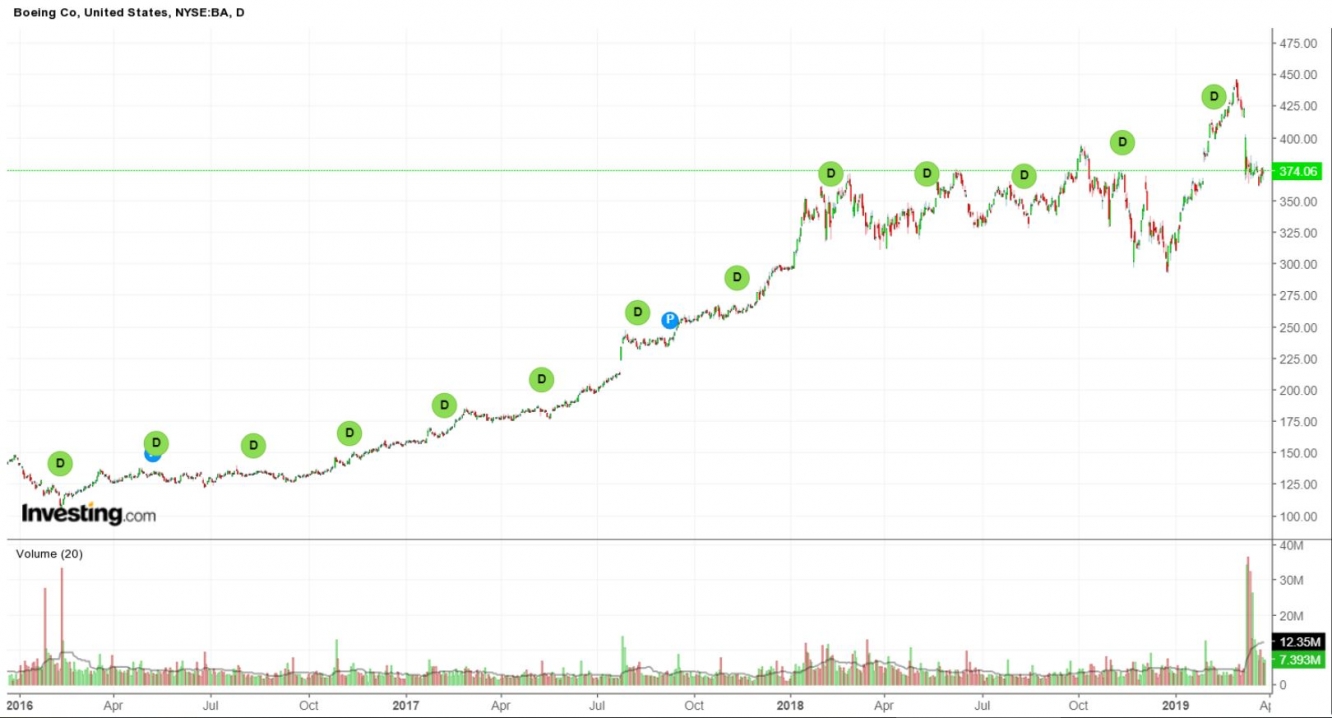One of the stocks that has made the most headlines recently has been Boeing (NYSE:BA). Up until a few months ago, the company was in the news for getting order after order (military and civilian) as well as lifting the DJ30 up with it.
Looking at the last few years, Boeing reached its lowest point on 11/02/2016 when it opened at $113.18. It reached an intraday low of $102.10 and finally closed at $108.44. The highest point was reached on 01/03/2019, just three years later when it opened at $446.01 and finally closed at $440.62. That’s a rise of around 400%, depending on if you take the open, intraday or close, in 3 years, while the Dow Jones rose 170%.
Since the all-time high reached at the start of March, Boeing has lost nearly 20% of its value, for a large part due to the recent and much-publicized crashes of the Boeing 737 MAX 8 in Indonesia and Ethiopia. This has stoked fears that Boeing would be headed for a rough period, as it is rare for two new planes to crash in such a relatively short time with seemingly the same issue. Obviously, if it is confirmed to be a problem with the aircraft, and the indications are that it has to do with the MCAS system, then it’s not good news for Boeing. As a result of this, the Boeing 737 MAX 8 has been grounded worldwide and this is not the first time though that an entire fleet of Boeing aircraft was grounded. In 2013, after issues with its lithium-ion batteries, the Boeing 787 Dreamliner was grounded for 6 months. As we know, that hasn’t hindered Boeing too much in the long-term.
Nevertheless, in the short term, it is a setback for the company, as it does harm its reputation. In the meantime, Boeing has come out with a software fix which should prevent the issue from recurring. It is also possible that the company will need to make other adjustments to the aircraft which would lead to increased costs and thus impact profit margins. The first company (Garuda) has already indicated that it wants to cancel its order for this type of aircraft, and Boeing is facing its first lawsuit for the grounding of the Boeing 737 MAX 8 by Norwegian air and more could follow.
The main danger for Boeing would be a mass cancelation of orders for the Boeing 737 MAX 8, but this is unlikely for the following reasons:
First, for Boeing, it is imperative to restore the confidence of its customers and of passengers. Therefore, it will do anything it can to repair any problems with the aircraft as soon and as thorough as possible. Boeing was working on the MCAS fix already after the first crash, so the timeframe for a fix should be reduced by a few months if the same problem caused the crash that is, and the problem was indeed with the MCAS.
Second, there are no other good options for another narrow-body aircraft for the type of flights the Boeing 737 MAX 8 has been made for. The only other aircraft that would fit the bill would be the Airbus A320 Neo, but there are problems with switching to that type as well, which brings us to the third point.
Third, the problem with moving orders from Boeing to Airbus is that Airbus has a big backlog (just under 7,400 aircraft as of February 2019) which will take a few years to clear and any new customers would come at the end of the line. Thus, the expectation is that most airlines will wait for the improvements that Boeing will make to the Boeing 737 MAX 8 and stay with it. There is a lack of competition. For all intents and purposes, the market for commercial airplanes is a duopoly between Boeing and Airbus. China is trying to change this with Comac but is still too small and young to be a real player, at least for now.
Looking at the situation of Boeing beyond this crisis, we see it is situated well. Besides the fact that airlines must pick either Boeing or Airbus for the foreseeable future, there will be more than enough market share for Boeing. This is especially true if we look at the huge backlog Boeing has. As of December 31st, 2018, it has a backlog of 5873 commercial airplanes, of which an overwhelming majority (4708) of the Boeing 737. With an aim to increase the production rate from the current 52 a month to 57 a month it would take nearly 7 years to clear this backlog.
In addition, the commercial aircraft part is not the only revenue stream for Boeing, although it is the largest at around 60%. Defense, space, security & global services amount for around 40% of revenue. So even if there is a slowdown in the commercial part of the company it would be able to weather the storm, especially since we see global defense spending increase, of which Boeing is likely to benefit from as well.
From an investor standpoint, Boeing gives a great dividend. In 2016 it paid out $1.09 per share and last quarter it paid out $2.06 per share. This in itself obviously adds a lot of value over an extended period, making it even more attractive to take advantage of the recent price drop. In any case, long-term investors will be less spooked by recent events than short-term traders.
Therefore, I see Boeing as a good buying opportunity for the long term, unless something dramatic will happen.

